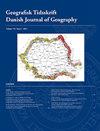Resurgent cities and the socioeconomic divide: the young, educated and affluent city of Copenhagen, Denmark
IF 1.1
4区 社会学
Q4 ENVIRONMENTAL STUDIES
Geografisk Tidsskrift-Danish Journal of Geography
Pub Date : 2022-01-02
DOI:10.1080/00167223.2022.2081927
引用次数: 1
Abstract
ABSTRACT The recovery of cities has led to increased wealth while simultaneously amplifying the socioeconomic spatial divide and polarization within the resurgent city. Recently, renewed interest in the socioeconomic consequences of the city’s growth has focused on residential differences in terms of e.g. income and education. In this paper, we examine how the recovery of cities has influenced the internal divide in the socioeconomic structures of demography, education, and employment. Utilizing Danish register data for all residents in Copenhagen during the period from 1992 to 2017, we describe the development of the resurgent city in relation to two sets of processes, academification (formal academic education) and workification (employment rate), with a focus on young adults, and compare with the suburban municipalities bordering Copenhagen. We show that Copenhagen, like other major European and American resurgent cities, has seen a decrease in the mean age of its residents and an increase in young adults who have completed an academic education and found employment in the city. Moreover, we find that the relationship between residence and workplace location has become more divided according to educational background, further emphasizing the socioeconomic inequalities within the city.复兴的城市和社会经济差距:年轻、受过良好教育、富裕的丹麦城市哥本哈根
城市的复苏带来了财富的增加,同时也放大了城市内部的社会经济空间鸿沟和两极分化。最近,对城市发展的社会经济后果重新产生的兴趣集中在收入和教育等方面的居民差异上。在本文中,我们研究了城市的复苏如何影响人口、教育和就业等社会经济结构的内部分化。利用1992年至2017年期间哥本哈根所有居民的丹麦登记数据,我们描述了这座复兴城市的发展,涉及两套过程,即学术化(正规学术教育)和工作化(就业率),重点关注年轻人,并与哥本哈根周边的郊区城市进行了比较。我们的研究表明,与其他欧美主要复兴城市一样,哥本哈根居民的平均年龄有所下降,而在该市完成学术教育并找到工作的年轻人有所增加。此外,我们发现居住和工作地点之间的关系根据教育背景变得更加分裂,进一步强调了城市内部的社会经济不平等。
本文章由计算机程序翻译,如有差异,请以英文原文为准。
求助全文
约1分钟内获得全文
求助全文
来源期刊
CiteScore
5.20
自引率
0.00%
发文量
5
期刊介绍:
DJG is an interdisciplinary, international journal that publishes peer reviewed research articles on all aspects of geography. Coverage includes such topics as human geography, physical geography, human-environment interactions, Earth Observation, and Geographical Information Science. DJG also welcomes articles which address geographical perspectives of e.g. environmental studies, development studies, planning, landscape ecology and sustainability science. In addition to full-length papers, DJG publishes research notes. The journal has two annual issues. Authors from all parts of the world working within geography or related fields are invited to publish their research in the journal.

 求助内容:
求助内容: 应助结果提醒方式:
应助结果提醒方式:


